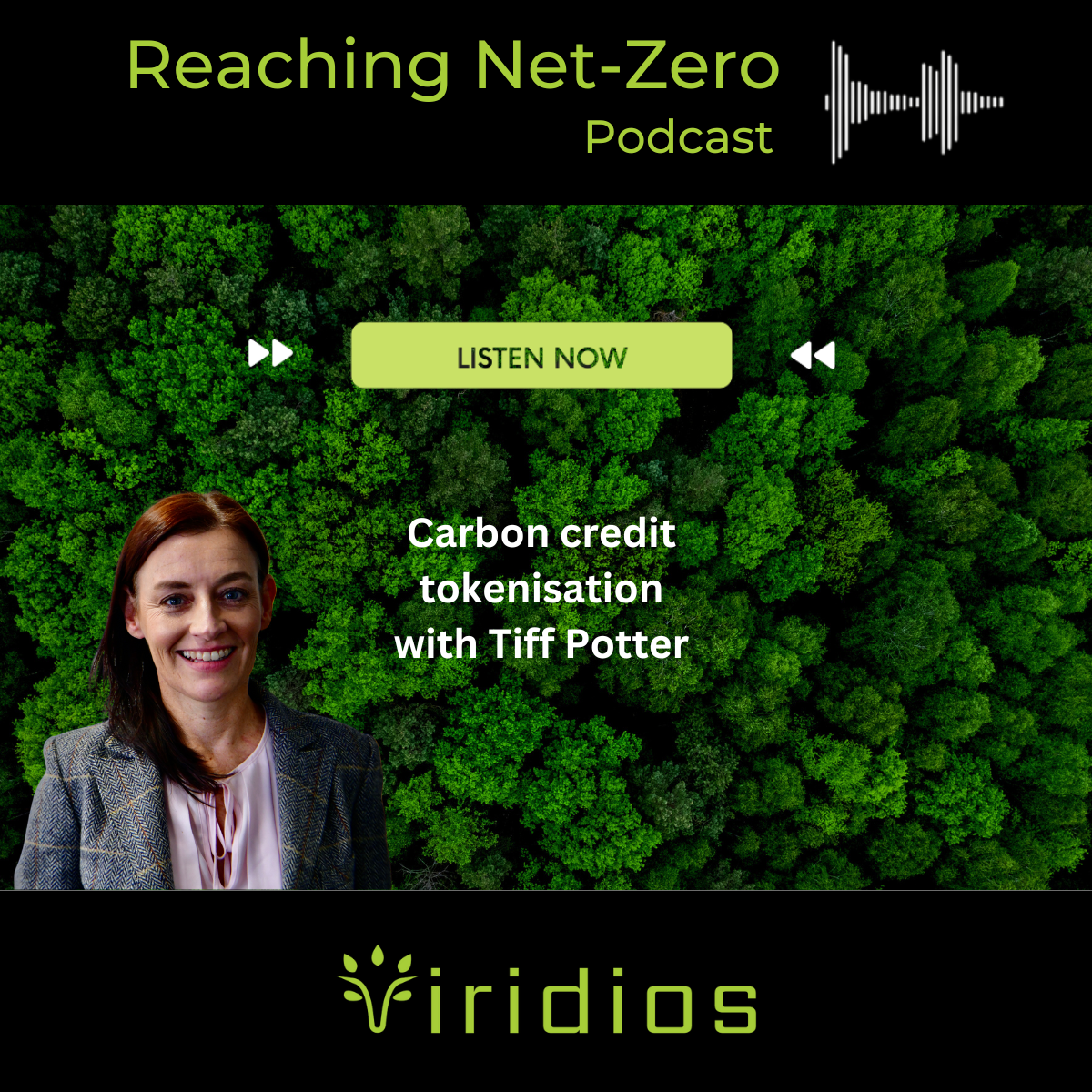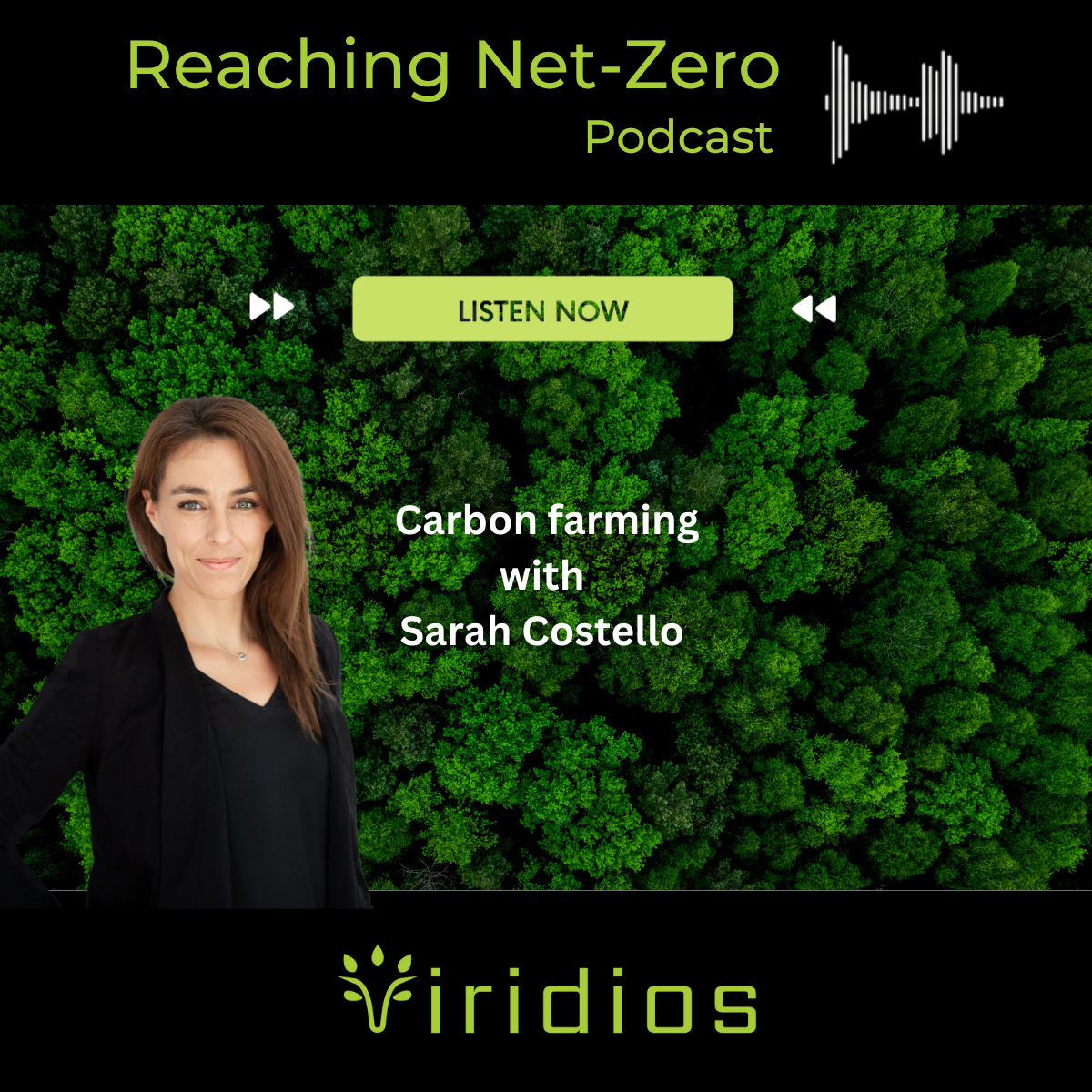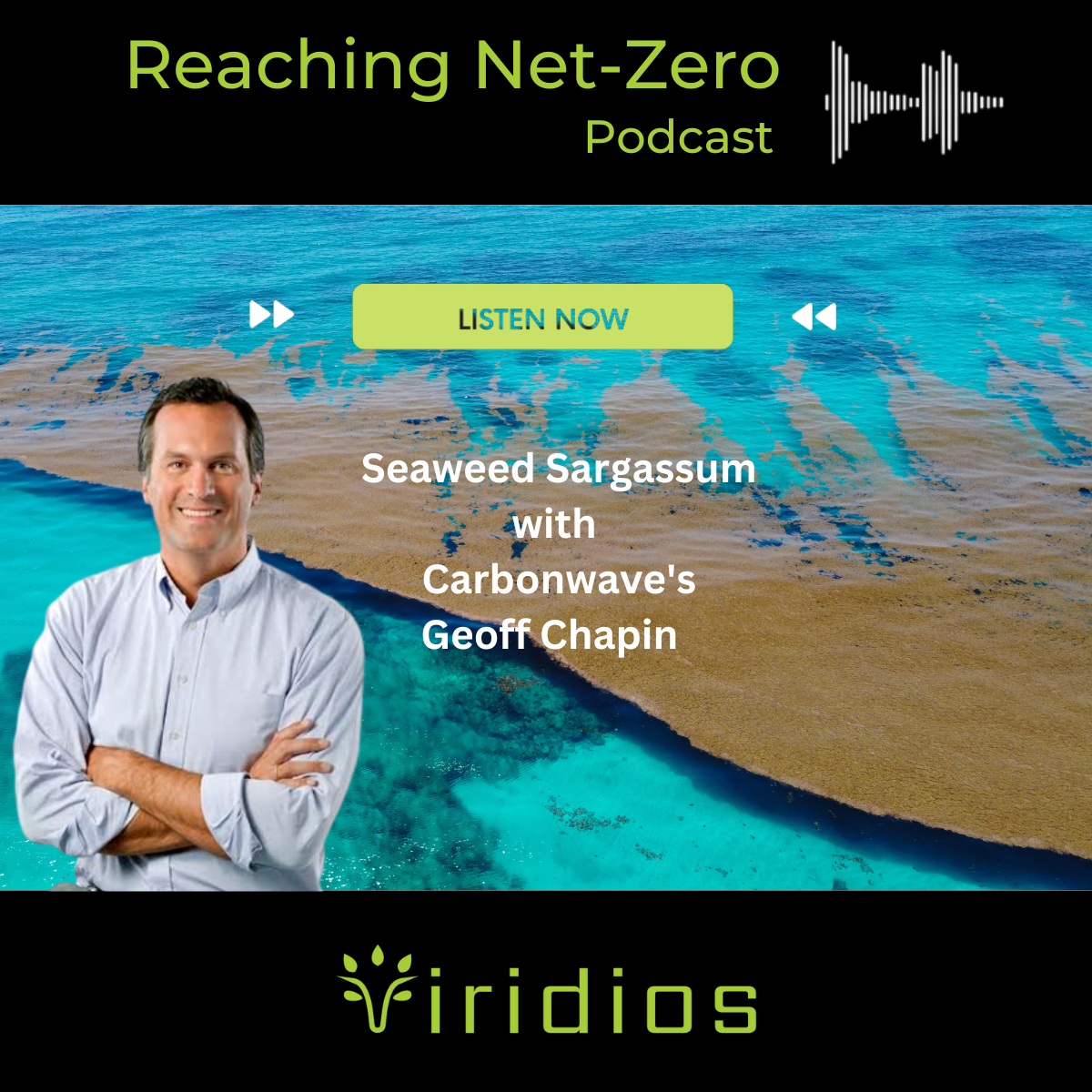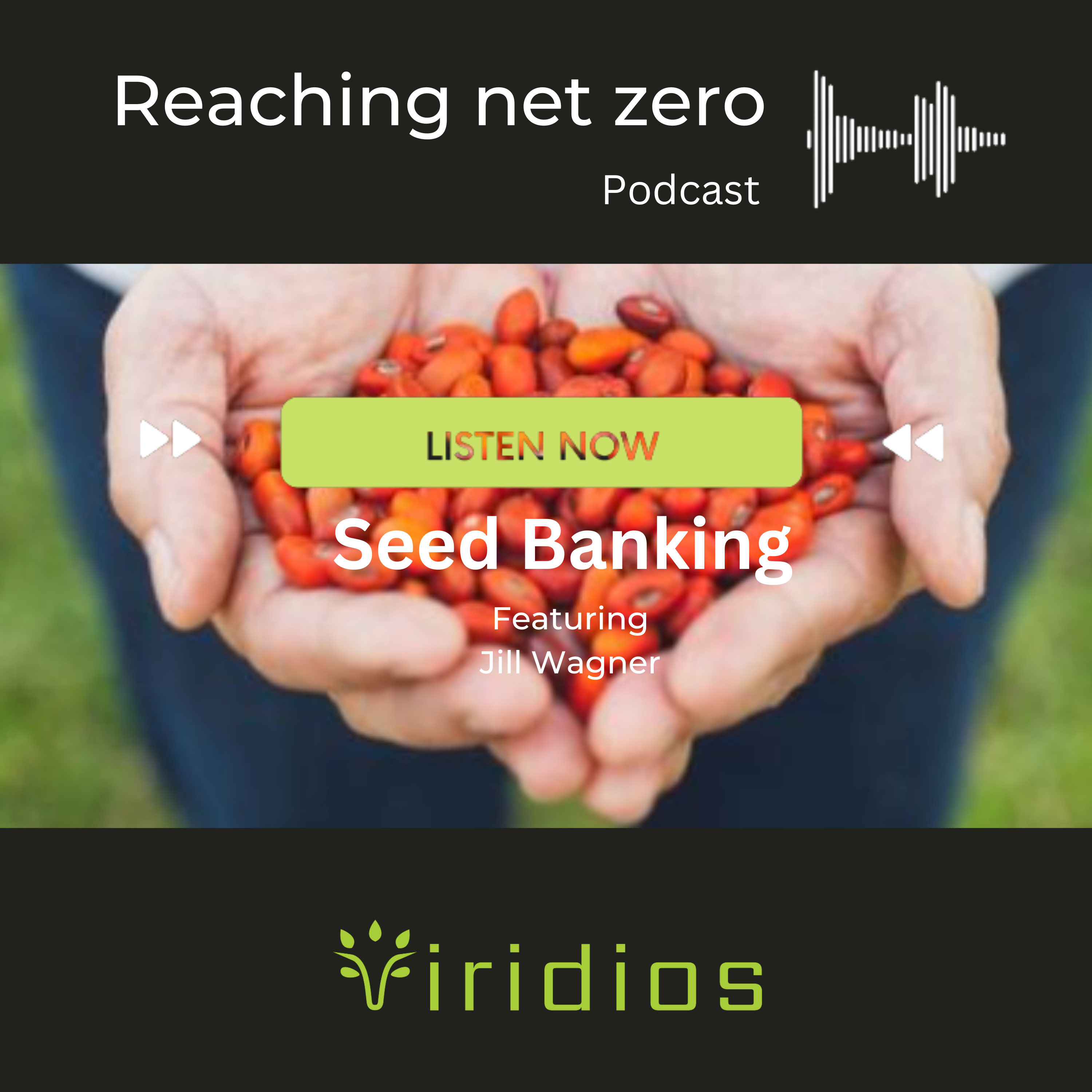Episode Transcript
Speaker 0 00:00:00 Welcome to Verios Capital's reaching net zero podcast. I'm your host, Tom Godfrey, and in this episode we look at Carbon credit tokenization and talk with TIF Potter. TIF is head of Origination America's at Verios Capital and has spent her career in the carbon markets and helping to protect our natural environment from working in gold standard certification business Sustain cert where she explored the world of decentralized finance and working as a UN advisor and delegate to Dominic to being a park ranger and field biologist in the Yellowstone National Park. Tiff has truly seen the frontier of the carbon market. Tif, welcome to the Reaching net zero podcast.
Speaker 1 00:00:47 Tom, thank you so much for inviting me. It's such an honor to be here.
Speaker 0 00:00:50 Now I have to ask you, what is it like being a park ranger and field biologist in the Yellowstone National Park and how did your work there lead you to the carbon markets?
Speaker 1 00:01:01 Well, Tom, in the wintertime, it's definitely really cold there, and it was a time that I was in a snow cave. It was somewhere between minus 30 minus 40 degrees and the ice was frozen over on my sleeping bag and I poked a hole through it and I started realizing that endangered species work is very expensive and there's a lot of government regulation. And I started thinking if there wasn't a better way to do environmental protection through profiting from conservation of water energy or forests. And that's when I started studying environmental finance. And at that time, the UN had started the clean development mechanism and the early stage carbon markets had started. And that's when I started thinking that that was probably a better approach to envir for protecting our environment.
Speaker 0 00:01:46 Now from the Wyoming wilderness to the digital wilderness, let's talk about carbon credit tokenization. Can you start by explaining what carbon credit tokens are?
Speaker 1 00:01:59 Sure. It's important that people understand three definitions and that is a definition of what is a digital token in cryptocurrency, what is blockchain? And then what do people refer to as a carbon back token? So cryptocurrency is a digital asset that may be exchanged, used as a means of exchange and or kept as a store of a value. When a blockchain network, sometimes it's described as a blockchain native asset since the blockchain architecture upon which it operates directly issues them. Frequently cryptocurrency can be used as a reward for users for maintaining the security of the cryptocurrencies network in addition to being used to pay processing fees on the network. A digital currency like cryptocurrency can be designed to work as a medium of exchange through a computer network that's not reliant on any central authority such as government or a bank to uphold or maintain it.
Speaker 1 00:02:53 Now the second key term is blockchain. So blockchain is a type of digital letter technology that consists of a growing list of records called blocks that are securely linked together using crypto graph. And that's a system in which there's a record of transactions made, let's say with Bitcoin or other cryptocurrency and maintained across have computers that are linked in a peer to peer network. So basically with a blockchain you can have a look at it and there is evidence of what's going on. So now we should define what is a carbon back token. And this is a very new term and there's a variety of different definitions, but generally people believe a carbon back to token can contain shared carbon information around emission records that helps with tracing the carbon offsetting or the, and the carbon capture storage or reuse of the carbon if it's captured. And this basically can be done to help companies prove they're pursuing environmental goals. There are digital representations of carbon credits and companies like Moss Tocan and Flow carbon have tokenized a carbon credit. So for example, one of Moss's tokens is equivalent to one carbon credit and one carbon credit is equal to one ton of carbon that is sequestered or removed from the environment.
Speaker 0 00:04:19 Yeah. Got it. Okay. So how many types of carbon credit tokens are out there?
Speaker 1 00:04:23 Sure, that's a great question. There's tons of different types of tokens. Generally there's about different, there's about nine different tokens, governance tokens, NFTs exchange tokens, security tokens, stable coins, and central digital currency, natural asset tokens, commodity tokens, utility tokens and carbon tokens. And I've seen in the marketplace so that, uh, these types of tokens which are used generally in cryptocurrency to be used as solutions in about nine different ways in carbon markets. And I could give you some examples of those.
Speaker 0 00:04:59 So how do I go about buying tokens?
Speaker 1 00:05:02 Sure. Right now there's not one central place to buy a carbon credit token. I'd say the best way, uh, to find one is to do do a general Google search. There are about two different companies who are offering these types of tokens, and I have a full list so people could contact us for it, but mainly they're available, uh, by doing the Google search and by looking up companies such as Lender Lake v b Green, um, Moss, solid wood, DOW two can, and their flow carbon. There's a bunch of them.
Speaker 0 00:05:33 Okay. Now, as someone who's worked for a a Carbon Market Standards body, what are some of the challenges the standard set and industry bodies are faced with when it comes to carbon credit tokens?
Speaker 1 00:05:47 Okay, this is a great question and I would look to an industry leader of ida, the International Emissions Trading Association, that came out with guidelines on blockchain use and carbon markets. And basically they believe that carbon standards should be the ones who are authorizing the use of tokens or not. So they believe that carbon backed digital tokens should come from verified and registered projects and standards must endorse those projects. They believe that there should be registry control and it's only the standards that may permit carbon credit. Tokenization and standards must have a system to place or perform this role that tokens are for issuance and, uh, verified credits and unverified canceled or retired credits are not qualified for tokens. That's generally what, where the market is headed towards transparency. IA believes that all token issuers should be subject to KYC or AML reviews. KYC is know your client and a AML reduces money laundering.
Speaker 1 00:06:50 And so this is important for consumer protection and transparency. IDA also believes in investor safeguards in that issuers must ensure that digital climate assets are fit for investors. And this is a crucial in cases where there's no direct link to the underlying carbon asset that there should be IT security. The use of proven methods of protection against cyber threats is a must. And with claims only the removed in retired tokenized credits are permissible for claims. The mere holding of the credits not retiring them is not a valid, uh, claim for, for compensation in terms of you're not, uh, you shouldn't, you shouldn't say that you've retired a credit when you have it.
Speaker 0 00:07:31 Okay. So ultimately, do you think that carbon credit tokens will help the world achieve its climate targets?
Speaker 1 00:07:40 Absolutely. So if we look at the state we're in for climate change, uh, 2021 McKinsey report said that we need about 4 trillion in new funding over the next 30 years to expand the amount of projects that we need to produce clean energy, deal with waste preserve for forests, and preserve our ecosystems on the scale that's needed to curb climate change. The way I look at it, I don't think we can scale to actually solve climate change without linking in with this market. There's a over a 900 billion market cap with cryptocurrency and there's a variety of users who are under the age of 34 years they've age. There's 300 million crypto users who believe in being crypto climate changers. They believe in funding and driving climate action, and they want to decarbonize our energy sector and invest in nature based solutions. So I don't think we can disrupt, uh, our systems right now to actually solve climate change without linking into it.
Speaker 0 00:08:42 Okay. So we've seen the wild ride. Many crypto investors and cryptocurrencies have been on over the past few years. What are some of the potential pitfalls with carbon credit tokens?
Speaker 1 00:08:54 Sure. Well, we could take a look at some of the, that, the timeline, the milestones of the con and the controversies around carbon back tokens. So we'll start with late 2021. So this is about a year ago. Bitcoin peaked at about 68,000 uh, US dollars per coin in November of 2021. And this is when crypto back carbon carbon token started booming. Clma DO had a coin that traded at more than a thousand dollars each for a very brief period. And there it was indicated that the carbon credits behind them sold for less than $10 each. This was according to Thomas Reuter's Foundation news. Now, climate DO'S tokens were backed by other crypto tokens from companies such as Moss and Tucan, but people started to wonder with this wild ride, this wild increase in the coin price was how were some of these profits flowing back to projects?
Speaker 1 00:09:52 Uh, were credits actually getting retired as they were claimed. Now, there was also some credits around the quality of the tokens and some of those tokens were considered zombie credits. A zaban, a zombie carbon credit is a credit that's been verified and issued, but is very old and it hasn't sold. So with the Clean Development Me Mechanism with the un, there were about a 955 million unsold credits about a couple weeks ago when I last looked, and some of those credits are being purchased and resold. And so the question is, is linking in these zombie credits, what are we achieving? But there are some credits that are verified, and so I'm not here to point the finger, but if you're going to get active in tokenization, I think it would be really exciting to inspire new project development and project development that's nature based solutions involving tons and tons of environmental impact, especially ones that deal with welfare, either providing food or providing clean water or other things that people actually need to survive. So I think it's would be exciting to put a lot of the cryptocurrency money to work into new projects that have many sustainable claims.
Speaker 0 00:11:08 Now you touched on verification there. How important is it that the environmental claims around carbon credit tokens are verified?
Speaker 1 00:11:15 Sure. It's very important. So right now the Securities Exchange Commission of the United States is looking at going after false environmental claims. So although there isn't a lot of regulation around carbon credits, the idea that companies could be greenwashing, they could be subject to inspection and, uh, fines from the Securities Exchange Commission. So this extends to claims around cryptocurrency in linking up to carbon back tokens. So right now, you really wanna have a verified claim no matter what you're doing. And if you have an unverified claim, I think you'll be subject to immense amount of headline risk, like all those people who have bought zombie credits, uh, and or you could be hunted down by a, a governmental entity.
Speaker 0 00:12:09 Okay. Now, recently you spoke, uh, at a climate week New York City event about tokenization and blockchain, and you were quite literally flooded with questions. Now we, we don't have time here to go through all the questions you were asked it asked on the day, but we have, uh, we've, we've got five here that I think we will have time to address. So let's, uh, let's start from the top. Um, so this question here, apart from the product design document, is satellite data and ground truth used for assessing carbon credit quality?
Speaker 1 00:12:48 It is, and I think that ground truthing unfortunately will not go away anytime soon. I do think a great marriage of blockchain and carbon back tokens is the use of digital MRV and digitizing records so everybody can see what's going on. However, I do not think that there will be satellite data that is ever that good that you don't need any ground true thing. So ground true thing can be done by plot sampling, by measuring trees, by verifying what you're seeing in satellite data on the ground. So I think it's very, very important and I think if you hire a really good forest statistician or any statistician, you could randomly sample your areas and come up with a strategy to effectively cost effectively ground truth to match up the satellite data that's being produced to be able to merge those two tools together.
Speaker 0 00:13:43 All right. So this next question, what role will regulation play in the field taking into consideration the skepticism that has historically been shown from regulators and governments towards the overall crypto market?
Speaker 1 00:13:58 Sure. I mean, right now the cryptocurrency market is trying to overturn the Apple card of traditional banking and it would be argued that most new emerging tools and markets go through a stage where there's some level of regulation that's required. So there will be some regulation in the United States. The Securities Exchange Commission chose not to regulate carbon credit specifically. It is argued that there are some carbon futures that could be covered by the commodities futures Trade commission, but generally there is not a lot, lot of regulation. However, the Securities Exchange Commission is starting to regulate greenwashing and preventing false environmental claims. So I think no one is safe from that, including the crypto market. And there will be very clear regulation coming around the fines that people can face if people are making unverified claims.
Speaker 0 00:14:56 Okay. Next one. What is your opinion of the role of crypto in improving in accelerating project development or project origination?
Speaker 1 00:15:07 Okay, well the market cap of cryptocurrency is over 900 billion and if we need over $4 trillion to solve climate change, I don't see us solving climate change without marrying these two markets together. I think tokenization can happen, especially with funding carbon futures and investing early stage project. Just having worked with standard and goal standard and working with hundreds of project developers, they have a need for more financing and smaller doses. And I think the cryptocurrency market is perfect for this and it could also be good at tracking success on blockchain. So I think for sure this our carbon credit market and our climate crisis could be improved by putting these funds to work.
Speaker 0 00:15:57 All right. Now, how do you evaluate projects and their potential credit quality if they're in their early stage of development and are not verified yet and will not be verified soon?
Speaker 1 00:16:11 Okay, this is a great question. And having worked with Sustained Cert looking at Gold standard projects, I looked at over 4,000 ideas in my time there and helped about 400 into certification. So I feel like I have a pretty good sense of how to identify quality of a project at very early stages. The most important thing to look for in an early stage project is if a project developer has identified and approved carbon methodology, the UN clean development mechanism with the UN F Triple C has a list of carbon methodologies that many of the other voluntary carbon market standards have adopted, like Goal Standard and Vera. And there's just one long list of methodologies. So early stage projects that have picked a methodology that match their emission reduction type is a great sign of early success of a project and they're on the right path. The second thing that I look at to evaluate potential of a project is if the project has hired a carbon project subject matter expert that has experience with issued credits of that carbon methodology, they're hard to find, but they're out there and if a product developer has done their due diligence to find that person that matches that carbon methodology, to me those are the two, two points that I see that means the product developers off to a very good start.
Speaker 0 00:17:38 Now finally, what are some of the resources you'd recommend to learn more about the voluntary carbon markets and any tips for someone starting a career in the space?
Speaker 1 00:17:50 Sure. First of all, I think Sustain Cert has a great online learning source called Sustain Cert Academy that has some very basic videos on how the carbon market works. The UNF C also has some pretty good videos on this. And the other thing that I would recommend, um, would be LinkedIn. There's a lot of really good groups on carbon markets. I have one that I host particularly on Blue Carbon, and there's about a thousand experts in that talking about Blue Carbon, uh, on a weekly basis. And I would also recommend that people book time with me and find a half an hour slot to sit with me and tell me about what they hope to achieve in carbon markets. I love meeting with new learners in carbon markets no matter what stage people's careers are in, and I love sharing with them the lessons I've learned from this marketplace.
Speaker 0 00:18:43 Tiff, thank you so much for joining the Reaching Net Zero podcast. Today. We can feel your energy and passion for the carbon market, and it's certainly a lot warmer than sitting in a a cave in the Yellowstone National Park, which sounded incredibly, I'm sure we'll all be watching as well to see where carbon credit tokens go. Thanks for your time.
Speaker 1 00:19:02 Thanks so much for hosting me.




